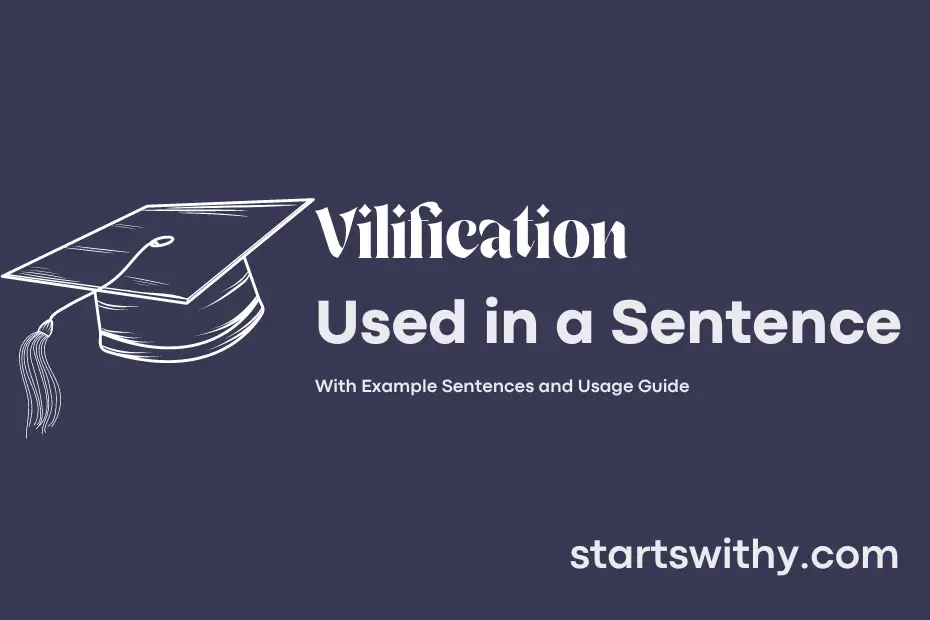Vilification is the act of unfairly portraying someone or something in a negative light, often through harsh criticism or defamation. This form of denigration is used to damage a person’s reputation, credibility, or character by spreading false or exaggerated claims.
In today’s digital age, vilification can spread rapidly through social media platforms, creating lasting damage to individuals or groups. It is important to critically evaluate information before sharing or perpetuating instances of vilification to prevent the spread of harmful and unjust attacks.
7 Examples Of Vilification Used In a Sentence For Kids
- Vilification means saying mean things about someone.
- We should always be kind and not engage in vilification.
- It’s important to not believe everything you hear, especially if it’s vilification.
- We should always treat others with respect and not spread vilification.
- Let’s choose to spread kindness instead of vilification.
- If someone is being bullied with vilification, we should tell a grown-up.
- Remember, words can hurt, so let’s not use vilification.
14 Sentences with Vilification Examples
- Vilification of a particular professor by students can create a negative atmosphere in the classroom.
- Engaging in vilification of classmates based on their appearance or background is harmful and unnecessary.
- It is important to avoid vilification of opposing viewpoints during debates or discussions in college.
- Social media platforms should not be used for the vilification of peers or faculty members.
- The practice of vilification can hinder constructive dialogue and learning opportunities in college settings.
- Participating in vilification campaigns against individuals can have serious consequences both academically and personally.
- Students should be mindful of the impact their words can have and refrain from engaging in vilification.
- The act of vilification serves no purpose in academic settings and only serves to create divisions among students.
- Constructive criticism is encouraged in college, but vilification has no place in a healthy learning environment.
- Cyberbullying and online vilification of fellow students is a serious issue that needs to be addressed by college authorities.
- In the pursuit of academic excellence, it is crucial to focus on learning and growth rather than vilification of others.
- The college administration should take proactive measures to prevent instances of vilification among students.
- It is important for college students to uphold values of respect and tolerance rather than resorting to vilification of their peers.
- The culture of vilification can be damaging to the mental health and well-being of individuals within the college community.
How To Use Vilification in Sentences?
To use the word “vilification” in a sentence, start by understanding its meaning. Vilification refers to the act of speaking about someone in a highly critical or disparaging manner, usually with the intention of damaging their reputation.
To incorporate vilification into a sentence, consider a scenario where someone is spreading false rumors about a colleague to tarnish their character. For example: “The CEO was caught spreading malicious vilification about his rival in an attempt to sway the board members’ opinions.”
Alternatively, you can create a sentence that showcases vilification as a common theme in politics or media coverage. For instance: “In today’s news, the relentless vilification of the opposition party continues, leading to growing division among the citizens.”
When crafting a sentence with the word vilification, aim to express a clear instance of defamation or slander aimed at someone or a group of people. Using vilification accurately can help emphasize the harmful impact of negative speech or false accusations.
By following these guidelines, you can effectively incorporate vilification into your writing and conversations to convey instances of unjust criticism or character attacks.
Conclusion
In conclusion, the use of sentences containing vilification can have damaging effects, as they can spread hate, misinformation, and incite hostility towards individuals or groups. Such sentences can perpetuate negative stereotypes, fuel discrimination, and contribute to a toxic online environment. It is essential to be mindful of the language we use and to refrain from vilifying others in our communication.
By promoting respectful dialogue and empathy, we can help build a more inclusive and understanding society. Constructive and empathetic sentences can foster harmony, promote acceptance, and contribute to a culture of mutual respect. Choosing our words carefully and avoiding sentences that vilify others is crucial in creating a more compassionate and tolerant community.



